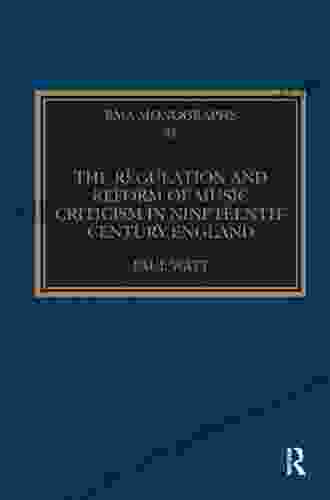The Regulation and Reform of Music Criticism in Nineteenth-Century England

Music criticism in nineteenth-century England underwent a significant period of regulation and reform. This was due to a number of factors, including the professionalization of music, the rise of the middle class, and the development of new musical genres. This article will explore these factors and their impact on the development of music criticism in England.
5 out of 5
| Language | : | English |
| File size | : | 4836 KB |
| Text-to-Speech | : | Enabled |
| Screen Reader | : | Supported |
| Enhanced typesetting | : | Enabled |
| Word Wise | : | Enabled |
| Print length | : | 144 pages |
The Professionalization of Music
One of the most important factors in the regulation and reform of music criticism in nineteenth-century England was the professionalization of music. Prior to this time, music criticism was largely written by amateurs who had little or no formal training in music. However, as the nineteenth century progressed, an increasing number of professional music critics emerged. These critics were typically trained musicians who had a deep understanding of music theory and practice. They were also often employed by newspapers and magazines, which gave them a platform to reach a wider audience.
The professionalization of music criticism had a number of effects on the field. First, it led to a higher standard of criticism. Professional critics were more likely to be able to accurately assess the quality of a musical performance or composition. They were also more likely to be able to provide constructive feedback that could help musicians to improve their work.
Second, the professionalization of music criticism helped to legitimize the field. Prior to this time, music criticism was often seen as a frivolous pastime. However, as professional critics began to emerge, music criticism began to be taken more seriously. This was due in part to the fact that professional critics were often able to provide valuable insights into musical performances and compositions.
Third, the professionalization of music criticism helped to create a community of musicians and critics. Professional critics were often able to network with each other and to exchange ideas. This helped to create a sense of community among musicians and critics, and it also helped to foster a greater understanding of music.
The Rise of the Middle Class
Another important factor in the regulation and reform of music criticism in nineteenth-century England was the rise of the middle class. The middle class was a growing and increasingly influential social group, and it had a significant impact on the development of music criticism.
The middle class was more likely to be interested in music than the upper class or the working class. This was due in part to the fact that the middle class had more leisure time and money to spend on cultural activities. The middle class also had a strong interest in education, and this led to a greater appreciation for music.
The rise of the middle class led to an increased demand for music criticism. Middle-class readers were eager to learn about new musical performances and compositions. They also wanted to be able to make informed decisions about which concerts and operas to attend. This led to a growing number of newspapers and magazines publishing music criticism.
The middle class also had a significant impact on the content of music criticism. Middle-class readers were more likely to be interested in music that was accessible and entertaining. They were also more likely to be interested in music that reflected their own values and beliefs. This led to a shift in the focus of music criticism. Critics began to pay more attention to the entertainment value of music, and they also began to consider the social and political implications of music.
The Development of New Musical Genres
The development of new musical genres also had a significant impact on the regulation and reform of music criticism in nineteenth-century England. Prior to this time, most music criticism focused on classical music. However, as the nineteenth century progressed, a number of new musical genres emerged, including opera, popular music, and jazz. These new genres appealed to a wider audience, and they also challenged the traditional canons of classical music.
The emergence of new musical genres led to a need for new approaches to music criticism. Critics had to learn to understand and appreciate these new genres, and they also had to develop new ways to write about them. This led to a more diverse and inclusive approach to music criticism.
The regulation and reform of music criticism in nineteenth-century England was a complex and multifaceted process that was driven by a number of factors. The professionalization of music, the rise of the middle class, and the development of new musical genres all had a significant impact on the development of music criticism in England. These factors led to a higher standard of criticism, a greater legitimacy for the field, and a more diverse and inclusive approach to music criticism.
5 out of 5
| Language | : | English |
| File size | : | 4836 KB |
| Text-to-Speech | : | Enabled |
| Screen Reader | : | Supported |
| Enhanced typesetting | : | Enabled |
| Word Wise | : | Enabled |
| Print length | : | 144 pages |
Do you want to contribute by writing guest posts on this blog?
Please contact us and send us a resume of previous articles that you have written.
 Top Book
Top Book Novel
Novel Fiction
Fiction Nonfiction
Nonfiction Literature
Literature Paperback
Paperback Hardcover
Hardcover E-book
E-book Audiobook
Audiobook Bestseller
Bestseller Classic
Classic Mystery
Mystery Thriller
Thriller Romance
Romance Fantasy
Fantasy Science Fiction
Science Fiction Biography
Biography Memoir
Memoir Autobiography
Autobiography Poetry
Poetry Drama
Drama Historical Fiction
Historical Fiction Self-help
Self-help Young Adult
Young Adult Childrens Books
Childrens Books Graphic Novel
Graphic Novel Anthology
Anthology Series
Series Encyclopedia
Encyclopedia Reference
Reference Guidebook
Guidebook Textbook
Textbook Workbook
Workbook Journal
Journal Diary
Diary Manuscript
Manuscript Folio
Folio Pulp Fiction
Pulp Fiction Short Stories
Short Stories Fairy Tales
Fairy Tales Fables
Fables Mythology
Mythology Philosophy
Philosophy Religion
Religion Spirituality
Spirituality Essays
Essays Critique
Critique Commentary
Commentary Glossary
Glossary Bibliography
Bibliography Index
Index Table of Contents
Table of Contents Preface
Preface Introduction
Introduction Foreword
Foreword Afterword
Afterword Appendices
Appendices Annotations
Annotations Footnotes
Footnotes Epilogue
Epilogue Prologue
Prologue Richard Moskowitz
Richard Moskowitz Travis Mays
Travis Mays April R Smith
April R Smith Christopher Charlton
Christopher Charlton Vicki Lundine
Vicki Lundine Michelle Robinson
Michelle Robinson Mark J Curry
Mark J Curry Matthew Pearl
Matthew Pearl Jami Fowler White
Jami Fowler White Julia L Mickenberg
Julia L Mickenberg Kathleen Riley
Kathleen Riley Kevin D Lam
Kevin D Lam Roy O Williams
Roy O Williams Terry O Reilly
Terry O Reilly Duane F Smith
Duane F Smith John Kenney
John Kenney Jon Cope
Jon Cope Dexter L Booth
Dexter L Booth Carley Roney
Carley Roney Ansel Hatch
Ansel Hatch
Light bulbAdvertise smarter! Our strategic ad space ensures maximum exposure. Reserve your spot today!

 Ryūnosuke AkutagawaSacred Arrangements Flute: An In-Depth Journey into Its History, Design, and...
Ryūnosuke AkutagawaSacred Arrangements Flute: An In-Depth Journey into Its History, Design, and...
 Charles DickensDecoding the Streetwear Community: A Journey into Brand Culture and Lifestyle
Charles DickensDecoding the Streetwear Community: A Journey into Brand Culture and Lifestyle Hector BlairFollow ·19.4k
Hector BlairFollow ·19.4k Salman RushdieFollow ·15.5k
Salman RushdieFollow ·15.5k John ParkerFollow ·2.5k
John ParkerFollow ·2.5k Jeffery BellFollow ·2k
Jeffery BellFollow ·2k Italo CalvinoFollow ·13.9k
Italo CalvinoFollow ·13.9k John GreenFollow ·14.9k
John GreenFollow ·14.9k Adam HayesFollow ·12.4k
Adam HayesFollow ·12.4k Billy FosterFollow ·11.1k
Billy FosterFollow ·11.1k

 Jesus Mitchell
Jesus MitchellThe Diabetics Menu: Your Low Carb Options
If you're living with diabetes, you may be...

 Danny Simmons
Danny SimmonsThe Sam Reilly Collection: A Treasure Trove of...
In the realm of...

 Vic Parker
Vic ParkerThe Shepherdess of Siena: The Extraordinary Life of Saint...
Catherine of Siena, known as the...

 Christian Carter
Christian CarterDive into the Mystical World of Meraki Syren: A Literary...
A Literary Odyssey Through the Depths...

 Eric Hayes
Eric HayesSimplest Method on How to Remove Credit Cards from Your...
Do you have multiple credit cards...
5 out of 5
| Language | : | English |
| File size | : | 4836 KB |
| Text-to-Speech | : | Enabled |
| Screen Reader | : | Supported |
| Enhanced typesetting | : | Enabled |
| Word Wise | : | Enabled |
| Print length | : | 144 pages |










